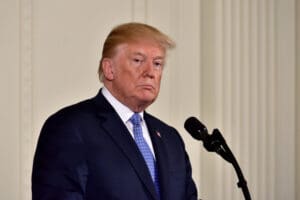More than a third of UK entrepreneurs are concerned about the financial impact of Donald Trump’s proposed trade tariffs, according to a new survey by entrepreneur network Helm.
The poll, conducted between 10 and 11 February among Helm’s 400 members—who collectively generate £8 billion in revenue—found that 37% of respondents fear the tariffs could add “significant costs” to their operations.
The US is the UK’s second-largest export market, accounting for 22% of total UK exports, making it a crucial trade partner for British businesses.
However, since the proposed tariffs mainly target goods rather than services, the majority of Helm members (63%) remain unconcerned. Many believe Trump’s trade threats are primarily a negotiating tactic, while others are unaffected as they either do not trade in the US or primarily export services, which are currently exempt.
Helm’s CEO, Andreas Adamides, noted that British entrepreneurs are sharply divided on the issue. He said: “While some fear rising costs and supply chain disruptions, others see potential opportunities as trade routes shift,” he said. “The resilience and adaptability of UK entrepreneurs will be crucial in navigating these uncertainties.”
Syd Nadim, founder of digital solutions firm Clock, which derives 40% of its revenue from the US, dismissed Trump’s rhetoric as “mostly bluff and bluster.”
“Canada and Mexico have learned to manage these threats. Since services are excluded from the tariffs, we’re confident they won’t affect us directly, though the broader economic impact is still a concern,” he said.
Meanwhile, Maz Darvish, CEO of AI firm Cognition Hub, pointed out that removing the de minimis threshold—which currently allows imports below $800 to enter the US duty-free—could level the playing field for American SMEs.
“If the UK and EU followed suit, it could boost local e-commerce and protect consumers from unsafe imports,” he said.
However, some entrepreneurs remain deeply concerned about rising costs and supply chain challenges.
Harry Zalk, co-CEO of infrastructure firm Matrix Group, warned that tariffs would “significantly increase costs for our imports and exports,” while the potential removal of the no-duty threshold would further strain e-commerce businesses.
For Tobi Schneidler, founder of computer accessories brand Bouncepad, the potential impact is clear.
“The United States is a major market for us. Tariffs would add to the challenges of Brexit, making US exports even tougher for us,” he said.
As Trump’s trade policies remain in flux, UK entrepreneurs will be watching closely to assess the potential impact on their businesses. Whether the proposed tariffs become a reality or remain a political bargaining tool, British exporters will need to remain agile in an increasingly uncertain trade environment.
Read more:
Third of UK entrepreneurs fear Trump’s proposed tariffs will hit business costs

